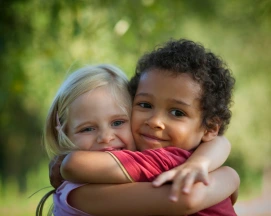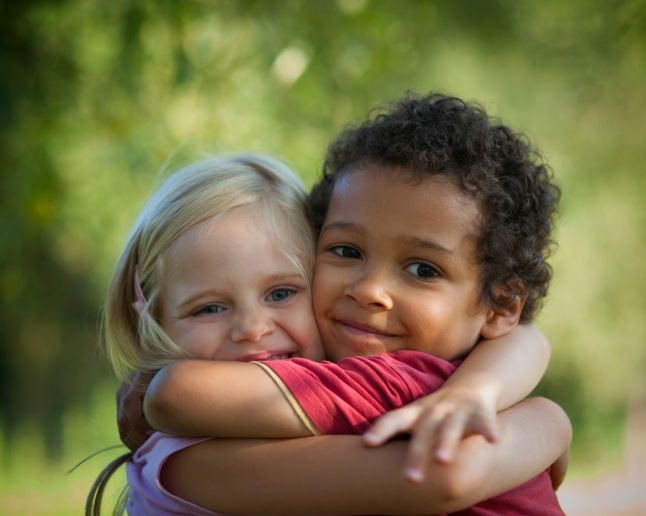 I have been teaching a long time, but I first heard of “sensory integration” concerns in Montessori training, not from one of my teachers, but from a fellow intern and mom. Her daughter was dealing with “tactile defensiveness” and was going to a pediatric occupational therapist. Wow, what??? Tactile defensiveness is feeling unexpected touch as pain, and a pediatric occupational therapist can help children learn to tolerate/integrate some sensory input that is lacking/needed/unwanted/uncomfortable. Who knew?
I have been teaching a long time, but I first heard of “sensory integration” concerns in Montessori training, not from one of my teachers, but from a fellow intern and mom. Her daughter was dealing with “tactile defensiveness” and was going to a pediatric occupational therapist. Wow, what??? Tactile defensiveness is feeling unexpected touch as pain, and a pediatric occupational therapist can help children learn to tolerate/integrate some sensory input that is lacking/needed/unwanted/uncomfortable. Who knew?
I am writing this in part because I have found that sensory integration issues are hard to see, there is no blood test for them, and yet they affect many children. Also, if you Google “sensory integration” you will get “Autism”, which is terrifying. Yes, most children with autism have SID, many/most children with SID do NOT have Autism. In my classroom, I currently see about 4 children a year who seem to be effected by sensory irritations. (OTs can also help with many other issues, such a problems with core-strength- children who have trouble holding themselves upright- hand strength and dexterity, and many other things.)
That next week, after that conversation with Isabelle about her daughter, I was pondering a child in my class who would regularly get called out for punching someone randomly. When I asked him, he responded : “They hurt me!”, even though they were generally only standing behind him in line. Bingo! Tactile defensiveness! He described it as needing people “this far” (a full arm’s length) away from him, or “it hurt.” His parents never bought into such a notion, but it was helpful for the class and for him. As soon as he could articulate what was bothering him, there was no more random punching.
This is a pretty simple story; much of sensory integration sensitivity is much harder to see or address. For one thing, a child can be both sensory “seeking” (wanting more sensation in some areas) and “sensory avoiding”. A child who is sensitive to sound can yell (?). As one OT explained it, “at least they are in charge of the noise.” And, remember, we are talking about children, who are trying to deal as best they can. And, why would they think that we do not feel the same things that they do?
If you or someone you know is sensitive to clothing, wrinkles in sheets, smells, sounds, certain kinds of lights, needs to move alot before they can relax to sleep, is always on the go, avoids certain textures of food or things on their hands, paints glue on their fingers, likes to wedge themselves into tight places, hates crowds, seeks out certain textures, rocks or jiggles their leg, fiddles, covers ears a lot, gets really revved up in large open spaces, moves away from others in a group, avoids hugs, seeks out hugs, doesn’t like to get hugs but wants to hug others….see, it is very complex!
Why does it matter? Because it can be annoying/disruptive/painful, and so can affect learning and/or relationships. And they/we don’t know how to describe, or what to do, so they/we may need help.
My learning about this is long and slow, as I am NOT a pediatric occupational therapist, nor do I play one on TV. My own son banged into people he loved and jumped down stairs, and around. So I yelled at him. He wore his boots on the wrong feet because they “felt better that way.” My stepson broke all the pencils, unbent all the paperclips and took Ritalin. I, of course, am completely normal when I jiggle my leg to keep myself on task, want to cry in florescent lights and sleep under a heavy blanket, even in the summer. My husband’s ears “hurt” in crowded restaurants, and he, too, cannot bear to stand in a line.
Wouldn’t it have been nice to have some help at some point for each of us, or at least someone who was willing to try to help us explain what we need/avoid? Yes, I wish I had not fussed at my children so much, and had not been fussed at.
So, if someone mentions that your child be evaluated by an OT, you might be getting some interesting data. This is not obscure, arcane gobbledey-gook, but real factors that affect real people, and can get “in the way”. One of our jobs, as parents and teachers, is to remove obstacles.

